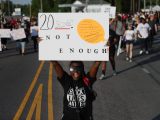Six Dead After Mass Protests in Colombia, Including Teen Shot by Police
May 3, 2021MEDELLIN, Colombia - Blood oozed out of the back of 17-year-old Marcelo Agredo’s head where a Colombian police officer’s bullet blasted a hole through his skull.
The force of the shot pushed the boy down onto the pavement as he ran from the gunfire. He died immediately.
Seconds earlier, a wave of protesters had swarmed the lone officer, who can be seen in video footage cruising into an intersection on his motorbike in a neighborhood in Cali, Colombia last week.
The officer stopped. Agredo rushed the motorbike and kicked the officer. The officer wobbled slightly on the bike before pulling out his gun and firing multiple shots directly at the boy.
The killing, which was shared widely on social media over the weekend, is another incident involving the use of lethal force by Colombian security forces against sometimes aggressive protesters during anti-government demonstrations.
Colombia’s police regularly fail to uphold international standards of human rights, which state that “restraint should be exercised in the use of force and damage and injury are to be minimized.” In September, Javier Ordoñez was killed by police during an arrest in Bogota when he allegedly broke a pandemic curfew.
Agredo is one of the first fatalities on a list of six dead so far amidst anti-government protests that began last week, triggered by a tax reform proposal that took aim at middle-class wallets. One of the six dead was a police officer.
On April 28th, violent clashes erupted when students, union workers and government opposition came out in droves to protest tax increases on basic goods and services, and the introduction of income taxes on members of the middle and working class.
President Iván Duque responded to the unrest by withdrawing the reform and asking his finance minister to draft a new one. Simultaneously, he sent soldiers into some of country’s major cities in an effort to support the police response to the protests. Members of Duque’s government have at times cast the police as victims of “terrorist vandals.”
“We are not going to allow these actions, the destruction of property and messages of hate to have any place here,” said Duque in a televised speech on Saturday evening as he justified the military’s presence.
The use of force by Colombia’s security forces over the weekend provoked José Miguel Vivanco, director of Human Rights Watch in the Americas, to call for peaceful expressions of political discontent in the South American country of 48 million.
“I repeat my urgent call for protests to remain peaceful and for the security forces to respect human rights. We have confirmed 6 dead in relation to the protests,” tweeted Vivanco.
Grievances here are magnified by decades of civil armed conflict and growing political polarization in the wake of a controversial 2016 peace deal that demobilized thousands of Marxist rebels.
Protests against the tax reform largely consisted of peaceful marches in cities and towns across the nation. But in Cali, where Agredo was murdered, some demonstrators broke into a bank and trashed it. Rioters also set the city’s bus stations ablaze.
Not far from the presidential palace, in the capital Bogota, looters ransacked retail shops and stole camera equipment, cell phones and televisions.
In Medellín, protesters torched a police vehicle. In other parts of the country, looters raided food stores and smashed shop windows. In some cases, anti-riot police responded to crowds with teargas and stun grenades.
Colombia’s anti-government protests are reminiscent of Chile’s 2019 wave of demonstrations, in which civilian marches in response to a metro fare hike turned violent and destructive. There, too, police brutality was widespread. That anti-government strike led to Chileans voting in favor of a landmark reform to the constitution last year.
Oddly, Duque’s tax reform was opposed from the start by members of the president’s own party.
Even former President Álvaro Uribe - the godfather of the party that currently holds power - opposed the tax reform, claiming it would hurt the middle class.
“A thousand times we asked [President Duque’s] government to not present the reform the way they did, because it was going to provoke a huge popular backlash,” said the former president, who mentored Duque and sponsored the freshman senator’s ascent to the presidency in 2018.
“And in the end, unfortunately they went ahead and presented the reform anyway.”
It remains to be seen whether the families of Marcelo Agredo and the others killed during the protests will see justice.

